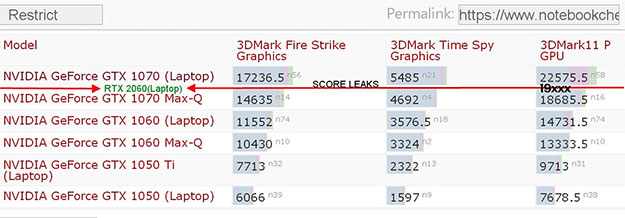Have you been holding off buying a new
gaming laptop in anticipation of
NVIDIA's Turing GPU architecture being ported over to mobile? Well, good news—it appears NVIDIA and its OEM partners are getting ready to introduce laptop models featuring mobile versions of the GPU maker's
GeForce RTX series in the near future.
There has already been (unofficial) chatter of
NVIDIA prepping its
mobile GeForce RTX series for a launch right before the Consumer Electronics Shows (CES) in Las Vegas next month. While that is not for certain of course, the latest round of leaks suggest it's at least plausible. As spotted by Twitter user and notorious leaker TUM APISAK, there are several mobile GeForce RTX parts that have made an appearance in Geekbench and 3DMark.
Starting at the lower end of the stack, a laptop featuring a
GeForce RTX 2060 GPU popped up on 3DMark. There are actually two separate listings, one with a regular mobile GeForce GTX 2060 GPU, and another with a Max-Q variant. What's interesting to note here is that NVIDIA hasn't yet launched a GeForce RTX 2060 product for the desktop.
In any event, the regular version sports a 960MHz core clockspeed and 6GB of memory clocked at 1,750MHz. We presume it's using GDDR6 memory chips and piping data through a 192-bit bus. For the Max-Q variant, the core clock is actually a little higher at 975MHz, while the memory is slowed to 1,500MHz.
 Click to Enlarge (Source: Twitter via TUM_APISAK)
Click to Enlarge (Source: Twitter via TUM_APISAK)
The performance numbers look promising, if they are legitimate. According to the leaked data, the mobile GeForce GTX 2060 GPU scores higher than a mobile GeForce GTX 1070 Max-Q, though lower than the regular variant.
TUM_APISAK also spotted a bunch of laptops on Geekbench with higher-end GPUs. They include the following:
- GeForce RTX 2080 Ti (ASUS Zephyrus M GM501GS): 280,486 OpenCL
- GeForce R TX 2080 (Unknown laptop model): 262,093 OpenCL
- GeForce RTX 2080 Max-Q: 250,642 OpenCL
- GeForce RTX RTX 2070 Max-Q: 223,753 OpenCL
The
GeForce GTX 2070 Max-Q and
GeForce RTX 2080 (with and without Max-Q) are both listed as having 8GB of memory, while the Ti model sports 11GB, according to the Geekbench listings.
Unfortunately we don't have OpenCL scores of our own to compare these with, but the bigger takeaway here is that Turing is seems headed to gaming laptops sooner than later.



